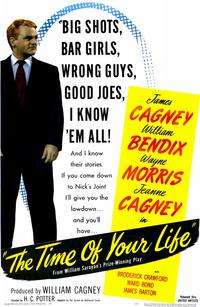The Time of Your Life (film)
The Time of Your Life is a 1948 American comedy drama film directed by H. C. Potter and starring James Cagney, William Bendix, Wayne Morris and Jeanne Cagney. A Cagney Production, The Time of Your Life was produced by Cagney's brother William and adapted by Nathaniel Curtis from the 1939 William Saroyan play of the same name. Cinematography was by James Wong Howe.
| The Time of Your Life | |
|---|---|
 Original film poster | |
| Directed by | H. C. Potter |
| Produced by | William Cagney |
| Written by | Nathaniel Curtis |
| Based on | The Time of Your Life 1939 play by William Saroyan |
| Starring | James Cagney William Bendix Wayne Morris Jeanne Cagney |
| Music by | Carmen Dragon |
| Cinematography | James Wong Howe |
| Edited by | Walter Hannemann Truman K. Wood |
Production company | William Cagney Productions |
| Distributed by | United Artists |
Release date |
|
Running time | 109 minutes 105 minutes (Turner library print) |
| Country | United States |
| Language | English |
| Budget | $2 million[1] |
| Box office | $1.5 million[2][3] |
Plot
The film follows the adventures of a group of regulars at Nick's 'Pacific Street Saloon, Restaurant and Entertainment Palace' in San Francisco. A sign outside tells people to come in as they are. At the center is the wealthy Joe (James Cagney), who has given up working to hold court at Nick's (William Bendix) bar. He desires to live "a civilized life" without hurting anyone and believes the real truth in people is found in their dreams of themselves, not the hard facts of their actual existence.[4] Joe has a stooge named Tom (Wayne Morris), who runs his eccentric errands until a woman with a past named Kitty (Jeanne Cagney) comes in and steals Tom's heart. Also appearing are Broderick Crawford as Krupp, Ward Bond as McCarthy, Tom Powers as Blick, and James Barton as Kit Carson.
Cast
_1.jpg)
- James Cagney as Joseph T. (who observes people)
- William Bendix as Nick (Saloon Owner Who Loves Horses)
- Wayne Morris as Tom (Joe's stooge and friend)
- Jeanne Cagney as Kitty Duval (stage name of Katerina Koronovsky)
- Broderick Crawford as Krupp (a bewildered policeman)
- Ward Bond as McCarthy (a blatherskite)
- James Barton as Kit Carson (a cowboy also called Murphy)
- Paul Draper as Harry (the natural-born tap dancing comedian)
- Gale Page as Mary L. (a woman of quality)
- Jimmy Lydon as Dudley Raoul Bostwick (a young man in love) (as James Lydon)
- Richard Erdman as Willie (the pinball machine maniac)
- Pedro de Córdoba as Arab Philosopher
- Reginald Beane as Wesley (the pianist)
- John 'Skins' Miller as A Tippler
- Tom Powers as Freddie Blick (a stool pigeon and frame up artist)
- Natalie Schafer as Society Lady
- Howard Freeman as Society Gentleman
- Renie Riano as Lorene Smith (a blind date)
- Nanette Parks as Elsie Mandelspiegel (a girl in love)
- Grazia Narciso as Nick's Mother
- Claire Carleton as 'Killer'
- Gladys Blake as Side-kick
- Lanny Rees as Newsboy
- Marlene Aames as Nick's Daughter
Production
The Cagneys admired the play and acquired its film rights on the condition that theirs not be in release longer than seven years. They gave their director and cinematographer two weeks for blocking, but changed their minds once filming began, spending freely and breaking their budget.[5] The film was shot mostly on one set
The film was shot using Saroyan's original ending where Kit shot and killed Blick offstage, whom the Production Code Administration had forced the producers to change from a police detective into an informer and blackmailer.[6] The audience heard the shots and saw Kit walk in relating the event as one of his stories "I shot a man once. In San Francisco. Shot him two times...Fellow named Blick or Glick or something. Couldn't stand the way he talked to ladies".
Preview audiences reacted unfavourably.[7] Cagney asked Saroyan to write a more acceptable ending but Saroyan priced his work out of Cagney's reach.[8] A new action-packed climax was substituted with Joe knocking him unconscious, leading Kit to think he had shot him dead, and Nick later throwing him out onto the street as Kitty and Tom state their intent to get married.
Reception
Box office
The film was a failure at the box office.
Remake
A Playhouse 90 television version ten years later starring Jackie Gleason as Joe earned critical acclaim, with Jack Klugman as Nick, Dick York as Tom, Betsy Palmer as Kitty, and James Barton reprising his role as Kit Carson.
References
- THOMAS F. BRADY (Feb 1, 1948). "HOLLYWOOD DEALS: Prospects Brighten for United Artists -Budget Runs Wild and Other Matters". New York Times. p. X5.
- Balio, Tino (2009). United Artists: The Company Built by the Stars. University of Wisconsin Press. ISBN 978-0-299-23004-3. p217
- "Top Grossers of 1948", Variety 5 January 1949 p 46
- LIFE. Time Inc. p. 51. ISSN 0024-3019. Retrieved 2015-08-21.
- p.145 Schickle, Richard James Cagney 1985 Applause Books
- p.1045 American Film Institute With Our Gates: Ethnicity in American Films 1911–1960 1997 University of California Press
- "The-Time-of-Your-Life – Trailer – Cast – Showtimes – NYTimes.com". movies.nytimes.com. Retrieved 2015-08-21.
- pp. 141-142 Lee, Lawrence & Gifford, Barry Saroyan: A Biography University of California Press
External links
External links
| Wikimedia Commons has media related to The Time of Your Life (film). |
- The Time of Your Life on IMDb
- The Time of Your Life at AllMovie
- The Time of Your Life at the TCM Movie Database
- The Time of Your Life at the American Film Institute Catalog
- The Time of Your Life is available for free download at the Internet Archive